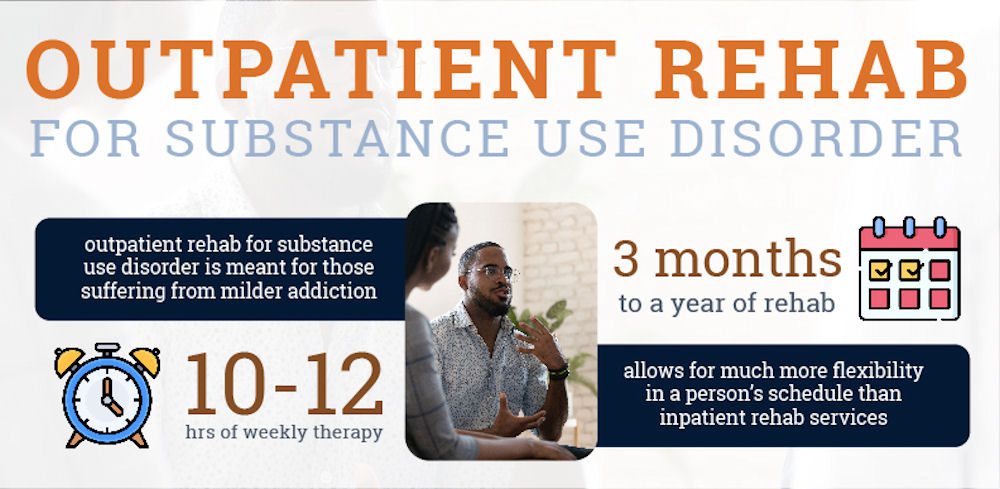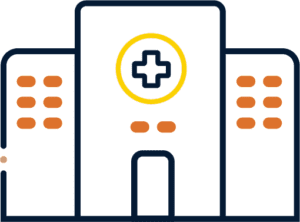Outpatient Drug Rehab in Illinois
 Everyone should recognize that substance addiction is always a severe issue. In some cases and with certain substances, the victim’s long-term health and life could be in jeopardy. An alcohol and drug addiction treatment facility does not always require the client to go through a residential treatment program. Outpatient drug treatment has become a great resource.
Everyone should recognize that substance addiction is always a severe issue. In some cases and with certain substances, the victim’s long-term health and life could be in jeopardy. An alcohol and drug addiction treatment facility does not always require the client to go through a residential treatment program. Outpatient drug treatment has become a great resource.
Most treatment professionals prefer to prescribe the least intrusive option possible, using the client’s drug or alcohol addiction profile as a guideline. Below, we will discuss how our outpatient drug rehab center near Chicago can offer the least invasive treatment option.
At Northern Illinois Recovery Center, we know that each person’s drug or alcohol addiction comes with its own challenges. However, we also know that it is possible to overcome these challenges, allowing them to move into a healthier and happier future. Outpatient addiction treatment is one option that can lead to this possibility. No one deserves to battle substance abuse alone.
Jump to Section
What are the Benefits of Outpatient Care?
One of the primary benefits of attending an outpatient drug treatment program is that patients can put into practice what they learn in therapy. Some people grow complacent in a residential treatment program.
After all, it seems easy to stay sober when the only people they meet are also working towards recovery. However, once these individuals leave treatment and face daily stresses, struggles, and temptations, they feel less sure of themselves.
For instance, if a person is living with people who are using drugs or alcohol continuously, they may feel like they need to use drugs or alcohol to fit into the house. Our outpatient program can help patients work through these challenges, continually adding to their repertoire of strategies and coping mechanisms.
Outpatient treatment programs also allow patients to renew their relationships with their loved ones. Drug and alcohol addiction damages many relationships, especially if people feel they have to lie or steal to fund their dependency. An outpatient drug rehab encourages patients to work with their family and friends to overcome their challenges.
Mental health disorders commonly occur alongside substance use disorders. Rigorous treatment can help heal both disorders. However, both may be chronic but you need to manage both for lifelong recovery.
One of the benefits of standard outpatient rehab programs is that they can make sure that co-occurring mental health disorders (including addiction) can be managed without a large time commitment. Opting out after treatment may lead to relapse.
Why Should People Seek Outpatient Drug Treatment?
Drug and alcohol abuse continues to be a problem across the country, but many people don’t seek the treatment that they need. In some cases, they fear that they’ll lose their job or their social standing if they seek treatment.
Alternatively, they may think that they can’t afford to find treatment centers. For those in one of the scenarios above, outpatient treatment is an excellent treatment option. Outpatient treatment allows people to stay at home rather than take several weeks off of work or school. During outpatient rehab, a person will attend treatment a few times a week.
During these therapeutic sessions, our team will provide the tools necessary to stay sober in the real world. Sometimes, these strategies can mean replacing harmful habits with healthier ones.
Alternatively, some forms of outpatient treatment help patients learn new skills. In each case, however, our team will tailor the patient’s treatment to their unique needs. As a result, the person will know that they’re getting the care and support that can help them stay sober for longer periods.
Consider Sober Living During Outpatient Rehab
Many of the people at our outpatient treatment program take part in our sober living program. This treatment option is ideal for those whose home environments are not conducive to sobriety. For instance, those living with other people who use drugs or alcohol may not stay sober for long periods.
However, with a combination of an outpatient treatment program and a sober living program, they can increase the likelihood of staying sober. Could this substance abuse treatment option support your recovery? It might be!
What Do You Do in Outpatient Rehab?


Our outpatient drug rehabilitation center in Chicago requires the client to attend a counseling session regularly. By our definition, the term “regular basis” means 2-3 times a week for up to 2 hours a meeting. We might also request they attend several group sessions. That’s not much to ask of someone in exchange for the opportunity to fight off their drug and alcohol addiction as well as start living normally again.
Our outpatient rehab center in Northern Illinois offers a reference to what treatment looks like in a typical outpatient drug abuse rehab center. Remember, we usually reserve outpatient rehab for clients with a moderate addiction and the capacity to act responsibly. We might also offer said services if a residential or intensive outpatient treatment option is too prohibitive.
A Commitment to Sobriety
The outpatient treatment process is not very complicated. Most of the other outpatient rehabs in Northern IL only require the client to do three things: stay clean, abide by schedules and rules, and show continual progress towards recovery. If they can do that, then both sides will be happy.
As a precaution, we also reserve the right to recommend alternative treatment options for clients who are struggling with substance abuse. The last thing anyone wants to see is the client going into relapse and disappearing from treatment. If they require additional support, we have to take steps to deliver recovery.
Why Should You Consider Outpatient Drug Treatment Centers?
As we stated above, some clients need nothing more than drug abuse therapy services. With that said, we do have clients who need a higher level of intervention, but other options are too prohibitive. For them, we have to offer the outpatient treatment option with a higher level of scrutiny, but other options are too prohibitive. For them, we have to offer the outpatient rehab option with a higher level of scrutiny.
Our outpatient drug abuse rehab center in Northern Illinois plays host to people living with the following circumstances:
- Inability to cover the cost of residential treatment
- Time restrictions due to work or school
- Childcare responsibilities
- Family breadwinner
- Reassignment from higher levels of treatment
To learn whether you’re a candidate for our outpatient treatment program, please reach out to our team.
What Can an Outpatient Drug Rehab Center Treat?
Outpatient programs are ideal for treating a range of substance use disorders.


The best way to determine whether this treatment option can address a person’s drug and alcohol addiction is for them to call one of our outpatient rehab experts. It might be a way to avoid inpatient treatment and the costs associated with it.
Alcohol IOP
An alcohol IOP can be highly beneficial for many individuals. For those who do not require 24/7 monitoring, intensive outpatient treatment allows for a flexible, but meaningful, recovery. Interestingly, the added responsibility for maintaining sobriety in an outpatient setting can help the individual develop tools they will use for the rest of their life.
Drug IOP
A drug IOP functions the same as an alcohol IOP. Intensive outpatient treatment is a common level of care for both alcohol and drug addiction. At Northern Illinois Recovery Center, we focus specifically on the individual and differentiate treatment depending on the substances involved.
What Happens Before Outpatient Drug Treatment?
After an initial assessment, we can then schedule a consultation and intake assessment. During this assessment, we’ll go over the individual’s history of drug or alcohol use, determine whether they’re battling a mental health condition, and decide if they’re a candidate for our outpatient treatment program. Once we’ve completed this exam, we can begin the outpatient rehab treatment process.
What is the Difference Between Inpatient and Outpatient?


For instance, a partial hospitalization program requires patients to commit to several hours of treatment for most of the week. Sometimes the benefits of outpatient rehab make it better to attend, especially in a scenario where one can’t live at the recovery center.
While inpatient and outpatient rehab programs may look similar, outpatient programs require fewer resources for the facility. Individuals in an inpatient rehab need places to sleep, multiple meals a day, 24/7 supervision, utilities, and more. This drives up the cost of treatment overall.
Many insurance plans cover outpatient treatment programs. In fact, some insurance plans will pay for all of this treatment instead of only part of it. As a result of this, many people are more likely to seek treatment.
Inpatient programs are typically divided into standard inpatient and residential treatment. A standard inpatient program offers one of the highest levels of care. Residential programs are a step-down, allowing visitors and more recreational time.
Alternatively, outpatient rehab may offer three levels of care:
- Partial hospitalization programs (PHPs)
- Intensive outpatient programs (IOPs)
- General outpatient programs (OPs)
PHPs, as said before, are one of the highest levels of care at an outpatient rehab. Intensive outpatient programs also require a high level of time commitment but less than PHPs.
So, intensive outpatient treatment may act as a step down from PHP, but not as initial treatment. A standard outpatient rehab program requires a few hours of commitment each week, making it the best choice for those who have completed intensive outpatient treatment.


Contact Our Outpatient Drug Rehab in Illinois
As a part of a highly populated treatment community, the folks at our outpatient drug addiction rehab are proud of our excellent reputation. We earned this reputation by giving each of our clients the elite addiction treatment care they deserve. What sets us apart from so many other rehabs is our ability to offer everything from outpatient drug abuse rehab options to custom aftercare programs and everything in between.
Here’s more information about our facility:
- We focus treatment on young adults
- Detox program referrals are provided
- We support sober living homes as an aftercare option
- Dual diagnosis therapy options with addiction as the primary condition
- We offer intensive outpatient treatment programs close to Chicago
If you have been suffering from a drug or alcohol addiction, you surely know the risks that come with refusing substance abuse treatment. The time to admit you have a problem and need help is now.
When you reach out for help, you can count on Northern Illinois Recovery being there. We will offer you an outpatient drug rehab center option if it makes sense to help you through the recovery process. It all starts with one phone call to one of our staff members.
Get the help you need at Northern Illinois Recovery!
855.458.1739
Northern Illinois Recovery Addiction Treatment Center


Licensed Physician and Surgeon
Dr. Beth Dunlap, a board-certified addiction medicine and family medicine physician, and is the medical director at Northern Illinois Recovery Center. She is responsible for overseeing all the integrated medical services at both campuses. Beth completed medical school, residency, and fellowship at Northwestern University, where she continues to serve on the faculty as a member of the Department of Family and Community Medicine. She has extensive experience in addiction medicine at all levels of care, and her clinical interests include integrated primary care and addiction medicine, harm reduction, and medication-assisted treatment.



